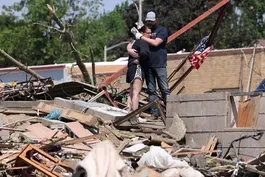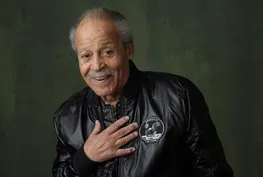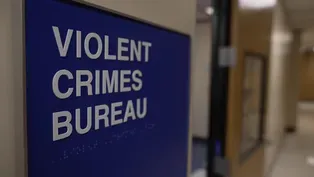
American detained by Syria died in custody, family says
Clip: 5/22/2024 | 6m 22sVideo has Closed Captions
Family of American held by Syria demands accountability after learning he died in custody
The family of an American psychotherapist detained in Syria says the U.S. government has informed them he has died in custody. Majd Kamalmaz was one of a half dozen Americans believed held by Bashar al-Assad’s regime, some of whom have allegedly suffered torture, or have even been murdered. Nick Schifrin spoke with two of Kamalmaz’s daughters, Ulaa and Maryam.
Problems with Closed Captions? Closed Captioning Feedback
Problems with Closed Captions? Closed Captioning Feedback
Major corporate funding for the PBS News Hour is provided by BDO, BNSF, Consumer Cellular, American Cruise Lines, and Raymond James. Funding for the PBS NewsHour Weekend is provided by...

American detained by Syria died in custody, family says
Clip: 5/22/2024 | 6m 22sVideo has Closed Captions
The family of an American psychotherapist detained in Syria says the U.S. government has informed them he has died in custody. Majd Kamalmaz was one of a half dozen Americans believed held by Bashar al-Assad’s regime, some of whom have allegedly suffered torture, or have even been murdered. Nick Schifrin spoke with two of Kamalmaz’s daughters, Ulaa and Maryam.
Problems with Closed Captions? Closed Captioning Feedback
How to Watch PBS News Hour
PBS News Hour is available to stream on pbs.org and the free PBS App, available on iPhone, Apple TV, Android TV, Android smartphones, Amazon Fire TV, Amazon Fire Tablet, Roku, Samsung Smart TV, and Vizio.
Providing Support for PBS.org
Learn Moreabout PBS online sponsorshipAMNA NAWAZ: The family of an American psychotherapist detained in Syria says the U.S. government has informed them that he died in custody.
Majd Kamalmaz was one of half-a-dozen Americans believed held by Bashar al-Assad's regime.
And, as Nick Schifrin reports, some of them were allegedly tortured, some even murdered -- Nick.
NICK SCHIFRIN: Amna, Majd Kamalmaz wasn't hiking up a mountain or fishing in the ocean, he was with his brood of grandchildren.
When he wasn't with them, he was helping other people's children who had suffered trauma in conflict or natural disasters.
He led an NGO that treated young victims of the war in Bosnia, the tsunami in Indonesia, and Hurricane Katrina.
In 2017, he traveled to Damascus to pay respects after his father-in-law's death.
He never came home.
Last week, the U.S. government told the Kamalmaz family that he was likely killed, a prisoner of Syria.
I'm now joined by two of Majd Kamalmaz's daughters, Ula and Maryam.
Ula, can you tell me about your father?
ULA KAMALMAZ, Daughter of Majd Kamalmaz: He was a kind-hearted, loving, empathetic individual who lived his attributes through his various roles as a family man and a psychotherapist who was devoted to his work and his family.
NICK SCHIFRIN: Maryam, what did the U.S. government tell you about what happened?
MARYAM KAMALMAZ, Daughter of Majd Kamalmaz: So there was around eight U.S. government officials that had gathered for our meeting to discuss my father's fate.
And they very, very clearly stated that they believe they have highly classified information that indicates that he has passed.
This piece of information was highly credible, and they truly believed that he was deceased within the Syrian government's hands within the prisons of the Syrian government.
There was no way for us to continue having any form of hope, basically, that he would be alive.
It was very clear he was gone and very tragic for us as well, because we had been praying and hoping for the past seven years and working very -- as much as we could to do the best that we can to bring him home alive.
And to know that he was gone was devastating.
NICK SCHIFRIN: Ula, how has your family endured this?
And, in any way or in some ways, does this provide a kind of closure?
ULA KAMALMAZ: I'm truly appreciative to have the opportunity to tell his story.
And, as a family, it's been an experience of lots of emotions.
We haven't heard from him for like seven years, nothing, not a phone call, no picture, no communication.
So it has been hard on the family.
My mom, which is his wife, and my grandmother, and his sisters, we kids, grandkids, it's been difficult.
Unfortunately, the worst has come true, that we will never be able to see him.
And this helps us a lot to know that his legacy can live on, and just very appreciative to be able to tell his story.
NICK SCHIFRIN: Maryam, State Department spokesman Matthew Miller was asked about your father earlier this week.
And this is what he said.
MATTHEW MILLER, State Department Spokesman: We saw the statement the Kamalmaz family put out over the weekend, and our hearts go out to them at this difficult time.
I would just say that we have engaged extensively to try to bring Majd Kamalmaz home, and we remain committed to seeking a full accountability - - seeking a full accounting of his fate.
NICK SCHIFRIN: What's your response to that statement?
MARYAM KAMALMAZ: They have told us what his fate is.
And I do appreciate all the work they have put into finding and being able to inform us about our father.
But I'm kind of confused by his statement, because they did very clearly indicate that he had passed.
And I don't hear him saying that in his statement.
NICK SCHIFRIN: And, further, what do you want the U.S. government to do now?
Or what will you and the family do now?
MARYAM KAMALMAZ: Usually, when a situation as this happens, that an American citizen that has never been charged with a crime, no case, no trial is murdered within the prison, you would expect the president of the United States possibly to call our family, as well as a statement put out, some form of accountability to be put on the Syrian government, as well as looking into persecuting them in a criminal lawsuit.
How could we be silent about an innocent person's death within the hands of another government?
This is an American's life.
Is it not valuable to the U.S. government?
They're completely mute right now.
NICK SCHIFRIN: The official U.S. policy on Syria is against normalization with the Assad regime until there's a political solution and that U.S. sanctions will remain on Assad until then.
Is that what you see this administration doing?
Are they doing enough?
MARYAM KAMALMAZ: I believe that the administration is not doing enough.
They need to push harder for accountability.
As you know, seven years -- my father was gone for more than seven years, and not once did the Syrian government acknowledge his detainment, even though we know for 100 percent that they had him.
And I believe the administration is not doing enough to learn our family members' fates and to bring them home, whether alive or not.
Though I am grateful that they were able to bring us this piece of information, it's still disappointing that they are not publicly acknowledging what they have told us.
NICK SCHIFRIN: Maryam and Ula Kamalmaz, we are so sorry for your loss.
Thank you very much for taking the time to speak to us tonight.
MARYAM KAMALMAZ: Thank you.
ULA KAMALMAZ: Thank you.
Amy Tan turns her literary gaze on the world of birds
Video has Closed Captions
Amy Tan turns her literary gaze on the world of birds in 'The Backyard Bird Chronicles' (7m 35s)
Deadly tornado devastates small town of Greenfield, Iowa
Video has Closed Captions
Small Iowa town becomes latest community devastated in active tornado season (3m 16s)
First Black astronaut flies in space after 63-year wait
Video has Closed Captions
First Black astronaut candidate on making it to space after 63-year wait (5m 52s)
Rep. Raskin on urging DOJ to investigate 'big oil'
Video has Closed Captions
Rep. Raskin on urging DOJ to investigate 'big oil' for deception on climate change (6m 25s)
Social media's role in the rise of youth violence
Video has Closed Captions
Social media's role in the rise of youth violence (8m 6s)
Trump's plans for healthcare, reproductive rights if he wins
Video has Closed Captions
Trump's plans for healthcare and reproductive rights if he returns to White House (7m 20s)
Providing Support for PBS.org
Learn Moreabout PBS online sponsorshipSupport for PBS provided by:
Major corporate funding for the PBS News Hour is provided by BDO, BNSF, Consumer Cellular, American Cruise Lines, and Raymond James. Funding for the PBS NewsHour Weekend is provided by...

















